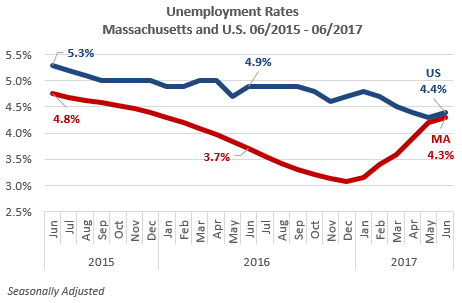Advertisement
Mass. Adds 10,000 Jobs In June; Unemployment Rate Ticks Up To 4.3 Percent
Influenced by a growing labor market, the unemployment rate in Massachusetts has climbed more than a full point since the start of the year, ticking up again in June to 4.3 percent.
The Executive Office of Labor and Workforce Development on Thursday announced the state added 10,000 jobs last month, but its unemployment rate rose for the sixth straight month, this time by one-tenth of a percentage point.
The state unemployment rate is now just slightly below the national unemployment rate of 4.4 percent, according to EOLWD and the Bureau of Labor Statistics.

Massachusetts has added 65,900 jobs during the one-year period ending in June, the state reported. The estimated number of jobs added in May — initially reported at 2,900 — was revised downward to 2,000, the state said.
"During the first six months of 2017, Massachusetts has experienced the largest increase in the labor force on record, and the 66.7 labor force participation rate is now 3.9 points higher than the U.S. rate," new Labor and Workforce Development Secretary Rosalin Acosta said in a statement. "These marked labor force gains should help ease labor market pressures and are signs of a growing economy in the Commonwealth."
University of Massachusetts Amherst economics professor Robert Nakosteen added more in an interview with WBUR: "If jobs are growing, and the economic environment looks more healthy, what can happen is that people who left the labor force come back in."
The state reported that the labor force — those working and actively seeking work — actually shrunk by 2,600 in May, with 7,600 fewer residents employed and 5,100 more residents unemployed over the month.
EOLWD data show 3,548,200 Massachusetts residents were employed and 160,400 were unemployed in June, for a total labor force of 3,708,600 people.
The unemployment rate is based on a survey of households, and the jobs numbers are based on a survey of employers, and both are subject to revision.
With additional reporting by the WBUR Newsroom